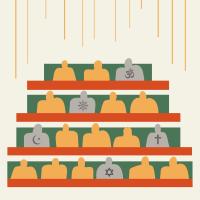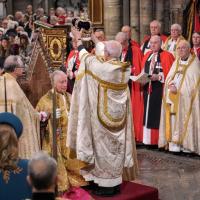I am a Manchester United fan. But I wish Coventry had won the FA Cup semi-final.
I have supported United alongside my hometown team, Bristol City, ever since the days of George Best, Bobby Charlton and Denis Law. (Bristol City never win anything so it’s nice to have a team that does win things occasionally – or at least used to).
In case you’ve had your head under a pillow over the weekend, or just avoid anything football-related on principle, Manchester United won an FA Cup semi-final replay on penalties by the skin of their teeth. 3-0 up and cruising after 70 minutes they somehow capitulated to allow Coventry, a team in the division below, to score three goals in the last 20 minutes. With virtually the last kick of extra time Coventry scored a fourth. Cue scenes of sheer unbridled ecstasy and abandon among the Coventry supporters.
What they experienced at that moment is what every sports fan longs for. Beating your intense rivals or mounting an astonishing comeback, snatching victory from the jaws of defeat - when it happens there is nothing like it. It is what United fans experienced when they beat Liverpool with a last-minute winner in the quarter final, or in the never-to-be-forgotten 1999 Champions League Final when they scored twice in injury time to beat Bayern Munich. Now it was Coventry’s turn.
But then the VAR (Video Assistant Referee), like a killjoy schoolteacher, telling the kids they should calm down and not get so excited, spoiled the party, by pointing out that in the build-up, a Coventry player’s foot was about three inches in front of the nearest body part of the last Man United defender, and so was offside. The offside rule exists to stop attackers gaining an advantage. Quite how those three inches gave the Coventry player an advantage is beyond me. Before VAR, the rule was that, if the attacker was basically level with the defender, it was deemed to be onside. Let’s face it, it was a perfectly good goal. Coventry should have won. They deserved to.
This would have been one of the great comebacks in FA Cup history. For a second-tier team to come back from 3-0 down with 20 minutes left against a team of that fame and pedigree to potentially win the game was extraordinary. The sheer joy and ecstasy on the faces of the Coventry fans, incredulous that their team could perform such a feat against the great Manchester United made every fan of every other club just wish something like that would happen to them.
VAR was introduced to eliminate human error and to bring a more scientific and measurable accuracy to decisions like this. The reality is that it's done nothing of the kind and in fact has made things worse.
Yet the worst thing of all this is that it denied Coventry fans their moment of ecstasy, a moment they would bask in for the rest of their lives.
It is part of a general fallacy in our culture, that science and objectivity give us all the answers we need. So, we try to reduce the role of human instinct, on the assumption that only what can be measured and exactly delineated is of any value. Hence Boris Johnson's mantra “follow the science” during the COVID pandemic.
The reality is that ‘following the science’ still leaves a place for human decision. Science doesn't necessarily tell you what to do. During the pandemic it could tell us about the rate of spread of the virus, but it didn't dictate that a lockdown of the severity which we endured was necessarily the right way to deal with it. There was a human choice to be made, balancing the effect on the economy and the potential loss of life with the mental impact upon young people that is now becoming apparent.
In football, VAR doesn't solve every issue. It can tell whether the ball hit a defender’s hand in the penalty area, but it still requires a subjective judgement by the referee or VAR official. Over the weekend’s semi-finals, it was decided to not award a penalty against Manchester City's Jack Grealish, but to do the opposite for Manchester United's Aaron Wan-Bissaka, for virtually identical actions. VAR has not taken refereeing decisions out of the equation. It hasn’t made it any better.
Yet the worst thing of all this is that it denied Coventry fans their moment of ecstasy, a moment they would bask in for the rest of their lives. It was the kind of moment for which football fans live – the experience that makes the years of watching 1-0 defeats away from home, trudging around the country following your team, worthwhile. A moment that, even as a Man United fan, I would not want to deny them. Of course I'll support United in the final against the robotically efficient Manchester City, but in that moment, VAR destroyed joy. And if that joy is caused by a marginal human error, who cares? Better to have the possibility of joy than a world where it gets taken away by a spoilsport official in a darkened room watching screens and drawing fine lines across the pitch.
Thinking that we can rely on the seen and not the unseen is fundamentally flawed.
Blaise Pascal once famously wrote that “The heart has its reasons of which Reason knows nothing.” His point was that we have a deep instinct for things which we just know are right, that we cannot prove and just have to assume, and the attempt to reduce everything to rationality, to scientific explanation, to what can be measured, thinking that we can rely on the seen and not the unseen is fundamentally flawed. Ever since the Enlightenment of the eighteenth century we have lived with this dream of a perfectly scientific world where everything can be reduced to numbers, mechanisms and measurements. In such a world there is no room for God, no room for miracles. It even conspired to rule out the joy of Coventry fans celebrating a wildly unlikely winner.
It tries to delude us that it takes subjective human or moral judgement out of the equation. but it can never do that. And in doing that, it sucks the joy out of life. Science is a great gift, and it can tell us a lot about our world. But it cannot tell us everything. It was never meant to bear such weight and the sooner we realise that it has its limits, and doesn't overstep its boundaries, the better.








